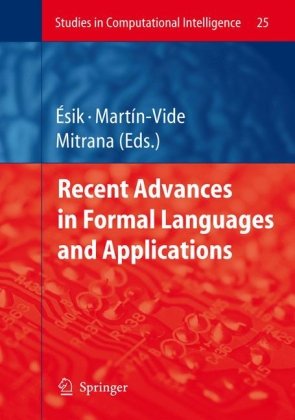

Most ebook files are in PDF format, so you can easily read them using various software such as Foxit Reader or directly on the Google Chrome browser.
Some ebook files are released by publishers in other formats such as .awz, .mobi, .epub, .fb2, etc. You may need to install specific software to read these formats on mobile/PC, such as Calibre.
Please read the tutorial at this link: https://ebookbell.com/faq
We offer FREE conversion to the popular formats you request; however, this may take some time. Therefore, right after payment, please email us, and we will try to provide the service as quickly as possible.
For some exceptional file formats or broken links (if any), please refrain from opening any disputes. Instead, email us first, and we will try to assist within a maximum of 6 hours.
EbookBell Team

4.1
90 reviews

ISBN 10: 3642070094
ISBN 13: 978-3642070099
Author: Zoltán Esik, Carlos Martín-Vide, Victor Mitrana
The theory of formal languages is widely accepted as the backbone of theoretical computer science originating from mathematics and generative linguistics. All human problem solving capabilities can be considered in a certain sense as a manipulation of symbols and structures composed by symbols, which is actually the stem of formal language theory. Language – in its two basic forms, natural and artificial – is a particular case of a symbol system.
The contributors present the main results and techniques of their specialty areas in an easily accessible way accompanied with many references having multiple roles: historical, hints for complete proofs or solutions to exercises and directions for further research where the reader may identify attractive problems. This volume contains areas, mainly applications, which have not appeared in any collection of this type. The book representing "a gate to formal language theory and its applications", will be useful as a general source of information in computation theory, both at the undergraduate and research level.
1. Basic Notation and Terminology
2. Janusz Brzozowski
3. Maxime Crochemore, Thierry Lecroq
4. Jozef Gruska
5. Tom Head, Dennis Pixton
6. Lucian Ilie
7. Jarkko Kari
8. Satoshi Kobayashi
9. Hans-Jörg Kreowski, Renate Klempien-Hinrichs, Sabine Kuske
10. Mitsunori Ogihara
11. Friedrich Otto
12. Holger Petersen
13. Shuly Wintner
14. Hsu-Chun Yen
recent advances in formal languages and applications
recent linguistic discoveries
recent research in second language acquisition
research languages
formal language research
Tags: Zoltan Esik, Carlos Martin Vide, Victor Mitrana, Recent, Advances, Formal, Languages, Applications